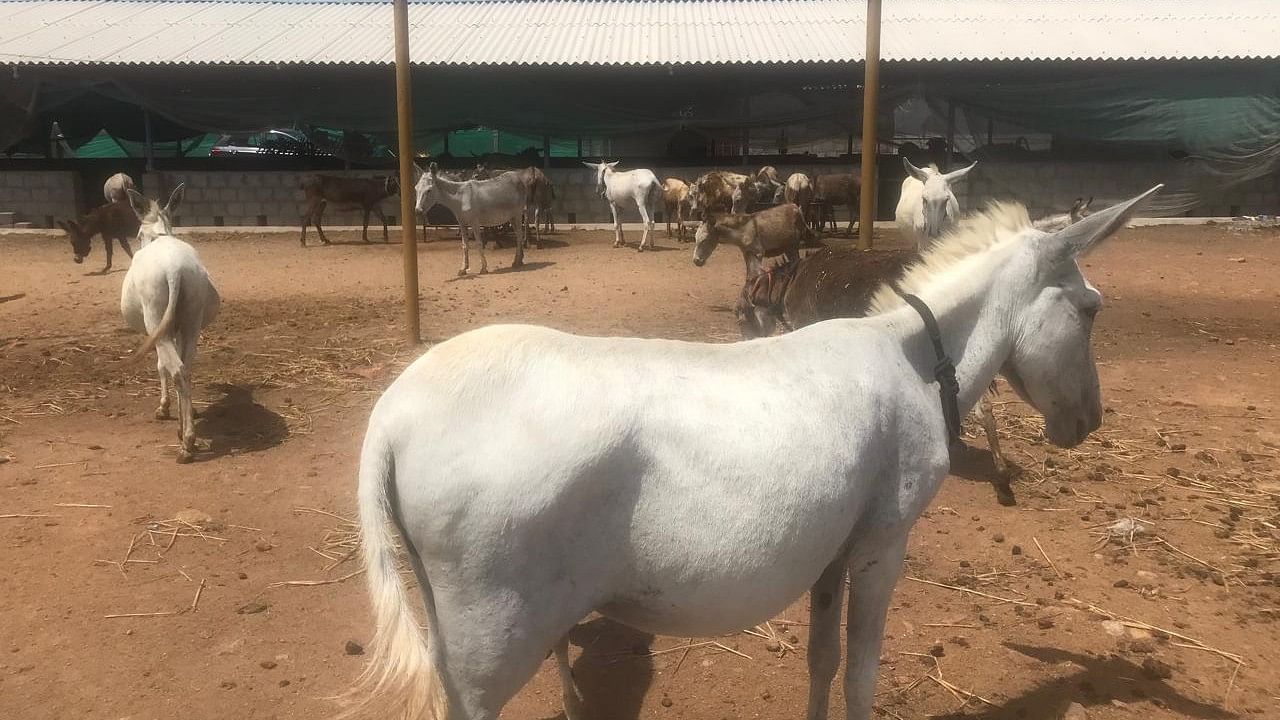
Taakshvi Agri Products has 16 donkeys across three breeds on its farm in Kolar.
Credit: Special Arrangement
A new company in Bengaluru is delivering donkey milk and milk powder. The former is priced at Rs 3,200 a litre and the latter at Rs 30,000 for half a kilo.
It’s not an uncommon sight for farmers to bring their donkeys to some neighbourhoods in Bengaluru and milk them on the spot. They are patronised by people who believe donkey milk improves immunity in children, especially newborns. Hippocrates reportedly used it as a treatment for arthritis, coughs, and wounds. Donkey milk is also valued in skincare. Egyptian queen Cleopatra, who is known for her legendary beauty, used to bathe in it. It is believed to have anti-aging and anti-inflammatory properties.
The renewed interest can be attributed to Europe where its consumption as milk and cheese is growing. Social media has also helped in spreading the word.
‘Most order smallest bottle’
The Bengaluru company, Taakshvi Agri Products, has been fielding queries from parents who want to give donkey milk to their children, fitness enthusiasts looking for low-fat milk, and entrepreneurs dealing in skincare.
The company was started six months ago. It has a farm in Kolar, a processing unit in Hyderabad, and an office at Nandini Layout in Bengaluru. It is currently servicing south Bengaluru. It sells donkey milk in bottles of 250 ml (Rs 1,000), 500 ml (Rs 2,000) and 1 ltr (Rs 3,200), and dispatches them in thermocol boxes filled with ice. The milk powder is sold in plastic packets of four sizes up to 5 kg.
“The shelf-life of milk powder is 1 year, whereas the milk can stay fresh in the freezer for three months,” says Vidya Ramachandra, its director.
They are selling an average of 12-15 litres of donkey milk monthly. “Most order the 250 ml bottle at first as they are skeptical of its taste and smell,” she says.
The number of repeat customers is not high and she can’t tell if it is because people do not like the milk or its pricing. However, they have one regular customer. “He orders it for his 9-year-old son after a doctor in Delhi recommended donkey milk to boost his health.” His relatives living in Malaysia followed suit, ordering 500 gm of milk powder for their infant. Their biggest order — 5 ltr milk — came from a beauty product company in Bellary.
‘Market not ready’
Half a litre of their donkey milk is about 80 times the cost of a 500 ml pouch of cow milk. Explaining the steep pricing, Vidya says, “We get 600 ml to 1 ltr of milk from a donkey per day and we have 16 donkeys on our farm. A cow can give 12-15 litres of milk a day. And it takes us 18-20 litres of donkey milk to make a kilo of milk powder — this process costs us Rs 18,000. Also, the cost of maintaining donkeys is very high.”
Prof C T Ramachandra, who has researched on donkey milk, points to another gap: “We don’t have enough donkeys in India to meet the growing demand. When I started researching donkey milk five years ago, their population was around 3 lakh,” he says.
Lack of certifications is also driving people out of business. A man, who has put his donkey milk business on hold, says, “Donkeys are not certified as cattle, and Food Safety and Standards Authority of India (FSSAI) hasn’t certified donkey milk for consumption. How will this inspire confidence in the public?”
Is it fit for human consumption?
According to Prof C T Ramachandra, head of processing and food engineering, College of Agricultural Engineering (University of Agricultural Sciences, Bengaluru), donkey milk is the closest to human milk in terms of composition and is safe to consume after boiling. It is low on fat and is rich in immune-boosting lysozyme. It tastes like human breast milk and has no smell. He concluded this after a three-year research undertaken on a DST-SERB grant.
“Prof B Surendanath (now retired) from the National Dairy Research Institute, and I formulated guidelines for the consumption of donkey milk and submitted them to FSSAI. I don’t know what’s the status (on issuing it),” he says.
Dr Edwina Raj, head of clinical nutrition and dietetics at a private hospital, says donkey milk may not be ideal for adults with lactose intolerance or gastric disturbance. “It has a high lactose content of about 5%,” she explains. Ashwin Bhadri of Equinox Labs, which carries out food, water and air testing and auditing, asks people to wait for FSSAI’s nod for the commercial distribution of donkey milk. “There have been reports of allergies and health issues,” Bhadri warns.